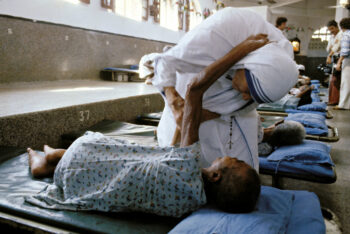St Teresa of Kolkata – Spiritual Principles

Victor Parachin
Here are the five foundational spiritual principles upon which she based her life and through which she impacted her world.
1. Prayer.
The driving force of Mother Teresa's boundless energy and compassion was prayer. No matter where she was, no matter how busy she was, no matter how many demands were placed on her, Mother Teresa prayed daily for lengthy periods of time. Explaining the source of her strength to a reporter, Mother Teresa said: “I don't think that I could do this work for even one week if I didn't have four hours of prayer every day.”
She required daily prayer of her sisters as well, permitting no exceptions to this spiritual discipline. In 1972 a devastating flood struck Bangladesh. Mother Teresa immediately dispatched a group of sisters to the area. There, the needs were enormous requiring the sisters to work nearly around the clock. Other relief workers asked if the sisters would make an exception and not interrupt their service for their prayer sessions. They consulted with Mother Teresa who promptly decided against this. She insisted they continue to meet for an hour of daily prayer and reminded the sisters that their strength to serve would dry up without daily prayer.
 2. Religious respect.
2. Religious respect.
One of Mother Teresa's final interviews (1989) was with Time Magazine reporter Edward. W. Desmond who asked her: “What do you think of Hinduism?” Her simple, frank response: “I love all religions.” Mother Teresa did not practice mere religious tolerance but complete religious respect and acceptance. For Mother Teresa, respecting the beliefs of others meant providing them with funeral rituals in keeping with their faith. When a dying person was brought to Mother Teresa's House For The Dying, workers immediately asked for a person's name and religion. Hindus were given Hindu funerals, Muslims were given Muslim funerals usually presided by religious leaders from their tradition. Furthermore, since the dying had no money, the Missionaries of Charity paid for all funeral expenses. One time a Bishop who was in Calcutta had no lodging so he asked Mother Teresa if he could spend the night in her House for the Dying. Mother Teresa paused for a moment before consenting, but on one condition: “Promise me you won't die. The burial of a bishop would be much too expensive for us,” she said.
3. Poverty.

Mother Teresa tends to a patient in the House for the Dying
From the very start, Mother Teresa and her Missionaries of Charity took four vows: chastity, obedience, poverty, and a fourth vow, to give "wholehearted and free service to the poorest of the poor." The vow of poverty meant that they would live just as the poor do. Mother Teresa explains:
“Poverty is necessary because we are working with the poor. When they complain about the food, we can say: we eat the same. They say, 'It was so hot last night, we could not sleep.' We can reply, 'We also felt very hot.' The poor have to wash for themselves, go barefoot; we do the same. We have to go down and lift them up. It opens the heart of the poor when we can say we live the same way they do. Sometimes they only have one bucket of water. It is the same with us. The poor have to stand in line; we do too. Food, clothing, everything must be like that of the poor. We have no fasting. Our fasting is to eat the food as we get it.”
4. Humility. 
“Do nothing out of selfish ambition or vain conceit. Rather, in humility value others above yourselves, not looking to your own interests but each of you to the interests of the others” (Philippians 2:3-4 NIV) is the teaching of scripture. Mother Teresa exemplifies the biblical virtue of humility to a heightened level. One example occurred on October 26th, 1985, when she was scheduled to address the General Assembly of the United Nations. On the day of the speech, she followed the normal routine at her Sister's house where she was staying. They rose early for mass followed by an hour of prayer and meditation. Next came the regular cleaning: first, washing her sari, then cleaning floors and toilets. All her life, she worked side-by-side with her sisters, and this day was no exception. Mother Teresa's expertise was cleaning the bathroom. “I am a specialist in that, probably the world's best specialist in cleaning toilets,” she said.
5. Joy.
Scripture notes that one sign of an advanced spiritual life is joy. (Galatians 5:22) Though Mother Teresa worked in the most challenging and potentially discouraging of circumstances, she did so with a heart filled with joy often talking about the “joy” of loving the poor and the “joy” of serving them. Speaking to her sisters, Mother Teresa stressed the importance of joy in their order: “Joy is one of the most essential things in our society. A Missionary of Charity must be a Missionary of Charity of joy.”
The woman who served the poorest of the poor with the greatest of joy, died on September 5, 1997 at the age of eighty-seven. Mother Teresa was given an Indian State Funeral. Only one other person was honoured this way at the time of death and that was Gandhi who was assassinated in 1948. The Vatican Secretary of State, Cardinal Angelo Sodano, delivered the eulogy saying: “The entire Church thanks you for your luminous example and promises to make it our heritage...I thank you for all you have done for the poor of the world...Dear Mother Teresa, rest in peace.”
Inscribed on her tomb, located on the first level of the Motherhouse of the Missionaries of Charity in Calcutta, are these words from the 15th Chapter of John's Gospel:
Love one another as I have loved you.
Action:
How to be like Mother Teresa
1. Act on your hopes, not your hurts.
Mother Teresa was a light to the entire world. Yet, at the same time she was experiencing lengthy periods of spiritual darkness. That paradox did not deter her from continuing on. Don't let difficulty keep you from serving. Remember that you don't have to have it “all together” to help others.
2. Pray.
When asked what the “secret” of her amazing spirituality was, Mother Teresa replied: “That's very simple: I pray.” As busy as she was, Mother Teresa spent time (long times) in prayer daily. “The fruit of prayer is love. The fruit of love is service. Only when you pray can you really serve the poor,” she explained.
3. Cultivate joy.
Mother Teresa often told her sisters: “Joy is very contagious. Try, therefore, to be always overflowing with joy wherever you go.” Follow her advice bringing a joyful presence to all.
 4. Allow the Divine to work through you.
4. Allow the Divine to work through you.
Wherever you are, whatever you do for work, whether your place in life is high or humble, remember that you can be an instrument of God doing good in the world. Mother Teresa, when asked if she had special talents said humbly: “I don't think so. I don't claim anything of the work. It's God's work. I am like a little pencil in God's hand. That's all.”
5. Embrace your imperfections.
Though Mother Teresa struggled with spiritual darkness and even doubt, she came to embrace that part of herself saying: “I have begun to love my darkness for I believe now that it is part, a very small part, of Jesus' darkness and pain on earth.”
6. When you see a need, respond.
Mother Teresa was practical not a theorist. “We see needs and we act,” she said. When asked about the causes of poverty, she responded: “We don't think about the why, how and when. We simply see the need and help as well as we can.”
7. Engage in spiritual fund raising.
“Let us more and more insist on raising funds of love, of kindness, of understanding, of peace,” said Mother Teresa. Anyone can do this, so do your part in such spiritual fund raising.
8. Meditate.
“Silence gives us a new outlook on everything,” said Mother Teresa who practiced meditation along with traditional prayer. Sit quietly at least a few times a week.
9. Be courageous.
Don't allow fear to hold you back. “Be daring and absolutely fearless of any obstacle, knowing that nothing is impossible with God,” said Mother Teresa.
10. Bless the planet with love, joy and peace.
Mother Teresa said: “In the world there is too much hatred, too much fighting. We will not be able to put them away with guns or bombs or any kind of weapon. We will attain that only through gestures of love, joy, and peace.” On this planet be the one who brings love, joy and peace to all people and in all places.
 Entries(RSS)
Entries(RSS)